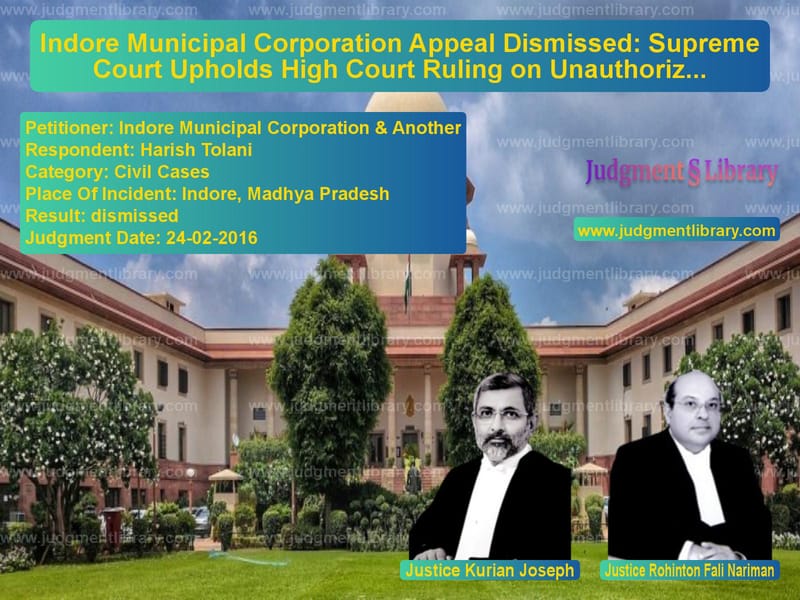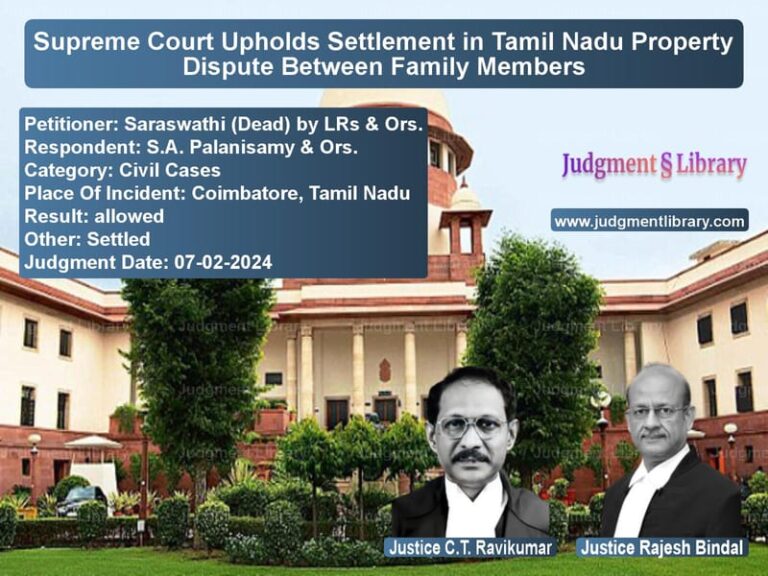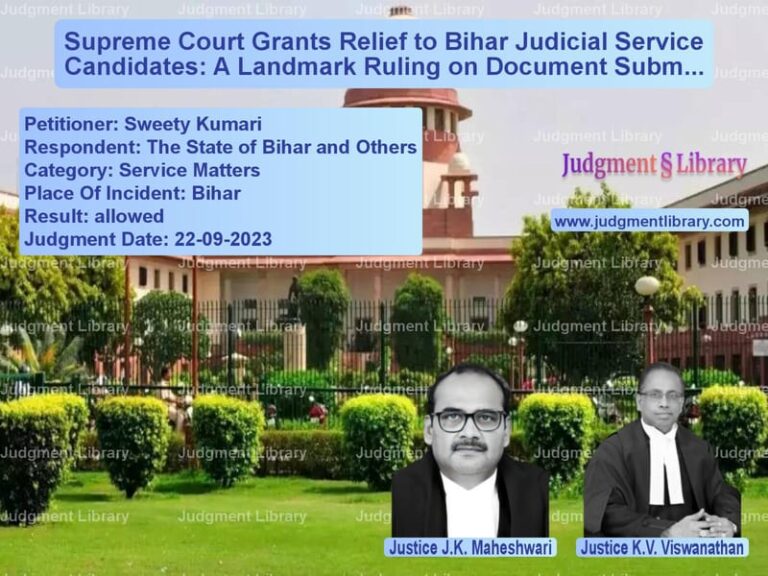Indore Municipal Corporation Appeal Dismissed: Supreme Court Upholds High Court Ruling on Unauthorized Construction
The Supreme Court of India, in the case of Indore Municipal Corporation & Another vs. Harish Tolani, dismissed an appeal challenging the High Court’s decision on the authority of municipal corporations to compound unauthorized constructions. The ruling clarifies that while municipal authorities have the power to regulate unauthorized construction, such power must be exercised within the legal framework.
The Court reaffirmed the High Court’s ruling that the Municipal Commissioner must first determine whether unauthorized construction can be regularized before ordering demolition. This judgment ensures fairness in municipal governance while maintaining adherence to the law.
Background of the Case
The dispute arose when the Indore Municipal Corporation took action against an alleged unauthorized construction belonging to Harish Tolani. A Single Judge of the High Court ruled that the Municipal Commissioner did not have the power to compound (regularize) unauthorized constructions, prompting the Indore Municipal Corporation to appeal before a Division Bench.
The Division Bench modified the Single Judge’s observations, clarifying that the Commissioner has the authority to consider regularization before proceeding with demolition. The municipal corporation, dissatisfied with this clarification, approached the Supreme Court.
Petitioner’s (Indore Municipal Corporation) Arguments
- The municipal corporation argued that the High Court’s ruling diluted its authority to take action against illegal constructions.
- The corporation contended that compounding of unauthorized construction must be done within prescribed limits under the law.
- They sought clarity on whether such compounding is legally permissible beyond a certain percentage of unauthorized construction.
Respondent’s (Harish Tolani) Arguments
- The respondent argued that the municipal corporation acted arbitrarily without providing an opportunity to consider regularization.
- He contended that the High Court’s ruling only clarified existing law and did not diminish the municipality’s authority.
- The respondent supported the Division Bench’s ruling that compounding should be considered before any demolition action is taken.
Supreme Court’s Ruling
The Supreme Court, in a judgment delivered by Justices Kurian Joseph and Rohinton Fali Nariman, dismissed the appeal, finding no merit in the municipal corporation’s challenge.
1. Clarification on Municipal Authority
The Court noted that the High Court had merely clarified that before ordering demolition, the Commissioner must consider whether the unauthorized construction can be regularized:
“The Division Bench of the High Court has further clarified that in the joint inspection, if any illegal construction is noticed, the Commissioner should first consider whether the unauthorized construction can be compounded before ordering for demolition of the said construction.”
2. Municipal Action Must Follow Legal Framework
The Supreme Court emphasized that any compounding (regularization) must be within legally permissible limits:
“Even going by the direction of the Division Bench of the High Court, the compounding cannot be permitted under law beyond a certain percentage of the alleged unauthorized construction.”
3. Joint Inspection to Determine Next Steps
The Court ruled that the Municipal Commissioner must conduct a joint inspection with the present owner of the building to determine whether the construction can be regularized and take appropriate action:
“These are all matters to be verified on a joint inspection to be conducted by the Commissioner with the present owner of the building, and it is for the Commissioner to take appropriate action under law thereafter.”
Final Verdict
The Supreme Court issued the following directives:
- The appeal filed by the Indore Municipal Corporation was dismissed.
- The High Court’s clarification regarding compounding unauthorized construction was upheld.
- The municipal corporation was directed to conduct a joint inspection before taking further action.
- No costs were awarded to either party.
Conclusion
This judgment provides clear guidance on how municipal corporations should handle unauthorized constructions, ensuring due process and adherence to the legal framework.
Key Takeaways:
- Municipal corporations must conduct joint inspections before taking demolition action.
- Compounding (regularization) of unauthorized constructions must be within legal limits.
- Courts can clarify municipal powers without undermining their authority.
- Legal procedures must be followed before taking action against property owners.
This ruling balances the interests of property owners and municipal authorities, ensuring that actions against unauthorized constructions are taken fairly and lawfully.
Don’t miss out on the full details! Download the complete judgment in PDF format below and gain valuable insights instantly!
Download Judgment: Indore Municipal Cor vs Harish Tolani Supreme Court of India Judgment Dated 24-02-2016-1741852835571.pdf
Direct Downlaod Judgment: Direct downlaod this Judgment
See all petitions in Property Disputes
See all petitions in Landlord-Tenant Disputes
See all petitions in Specific Performance
See all petitions in Judgment by Kurian Joseph
See all petitions in Judgment by Rohinton Fali Nariman
See all petitions in dismissed
See all petitions in supreme court of India judgments February 2016
See all petitions in 2016 judgments
See all posts in Civil Cases Category
See all allowed petitions in Civil Cases Category
See all Dismissed petitions in Civil Cases Category
See all partially allowed petitions in Civil Cases Category







